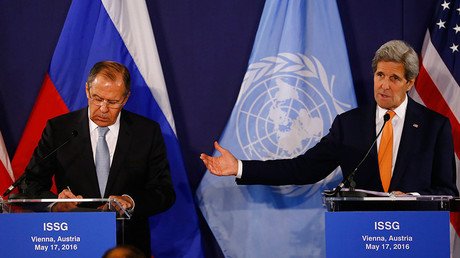Saudi Arabia warns of ‘Plan B’ for Syria while US calls on all sides to work together
While the world powers that gathered in Vienna on Tuesday to discuss the Syrian peace process stressed that all parties to the conflict should make peace a priority, Saudi Arabia’s foreign minister warned that time may be coming for “Plan B” in Syria.
“It was made clear that Bashar al-Assad has two choices – either he will be removed through political process or he will be removed by force,” Adel al-Jubeir told reporters after the International Syria Support Group (ISSG) meeting co-chaired by Russia and the US.
“We believe we should have moved to a ‘Plan B’ a long time ago,” he said.
“If they do not respond to the entreaties of the international community... then we will have to see what else can be done.”
The fate of Assad continues to be a stumbling block for members of the ISSG. Moscow opposes any attempts to forge a peace settlement conditional on Assad’s removal, with Russian Foreign Minister Sergey Lavrov stating Russia does not “support any particular personality, [we] support the fight against terrorism, and we don’t see a better alternative to doing that than the Syrian army.”
#Lavrov#Russia does not protect #Assad we support fight aft terror. We look on the ground the best option is #Syria army. #Vienna#ISSG
— Peter Oliver (@PeterGOliver_RT) May 17, 2016
Germany stressed that an agreement should outline steps that would lead to the removal of the Syrian leader. German Foreign Minister Frank-Walter Steinmeier asserted that Syria’s president must step down because “there can be no lasting future for this country with Assad.”
#Lavrov disagrees with #Kerry that no political solution while #Assad in power. #Syria govt best and only option in fight against terrorism
— Peter Oliver (@PeterGOliver_RT) May 17, 2016
US Secretary of State John Kerry also stated that, while Russia “has made it very clear” that Assad has signed on to commitments to peace talks, constitutional change, and elections, the Syrian president “has yet to live up to the first one, which is to participate fully in the Geneva talks on a political transition.”
US Secretary of State John Kerry also stated that, while Russia “has made it very clear” that Assad has signed on to commitments to peace talks, constitutional change, and elections, the Syrian president “has yet to live up to the first one, which is to participate fully in the Geneva talks on a political transition.”
“Those involved in this conflict with competing agendas are going to have to prioritize peace,” he stressed.
“We moved the ball forward. [But] to make all of this more than words on a page, some determined actions will have to be taken to make it happen. No one can be remotely satisfied with the situation in Syria.”
The ISSG group broadly agreed on the issues at hand, such as intensifying efforts to induce warring parties to stop fighting and disassociate themselves from extremists, expanding delivery of humanitarian aid, and facilitating a mutual release of prisoners held by the various sides in Syria.
However, beyond pledges, the meeting’s participants failed to agree on a new date to resume the Syrian peace talks, which broke off last month.
#Kerry says US always has leverage & options available. #Assad will never be safe without a political solution. #Syria#Vienna#ISSG
— Peter Oliver (@PeterGOliver_RT) May 17, 2016
“The issue is still waiting for some type of concrete outcome of this meeting. [The peace negotiations between factions] will become credible when there is credible cessation of hostilities and credible humanitarian aid delivery,” Staffan de Mistura, the UN special envoy to Syria, said.













